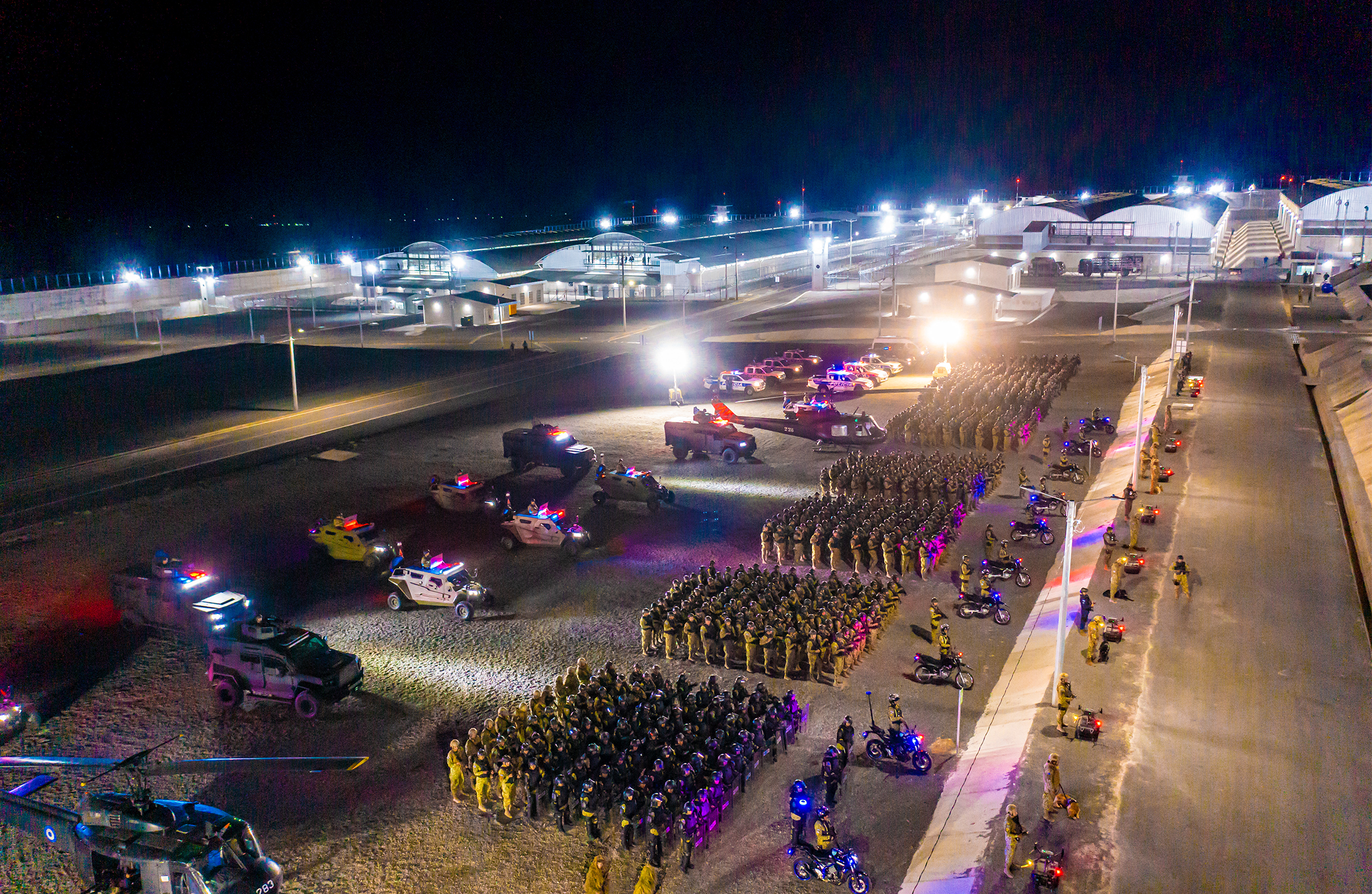Soldiers and police officers that staff the prison.
This article is bilingual! Scroll down for the English translation.
Esta ha sido una pregunta recurrente para mí por parte de las personas cercanas a la prensa y algunos más. Es difícil opinar sobre lo que uno no ha experimentado en carne propia, incluso puede ser atrevido, muy osado, por lo que intentaré abordar este tema dando una respuesta respetuosa, enmarcada dentro de la comprensión y la coherencia.
De la única forma en que tengo autoridad para expresarme es desde la tangencial posición que ostento como cautivo, pero aún aherrojado. Es distante mi condición a la de un recluso en el CECOT, el penal más grande de Latinoamérica, una cárcel de máxima seguridad con capacidad para aproximadamente cuarenta mil reos. Para comparar las dimensiones, El Salvador es un país de seis millones de habitantes y Colombia, superando su población diez veces, su cárcel más grande es para solo diez mil internos, resultando ser solo una cuarta parte del CECOT.
La construcción de este bastión obedece a situaciones que solo los salvadoreños comprenden, porque solo ellos son quienes experimentaron en carne propia los más de veinte años de violencia extrema, durante los cuales fue clasificado y determinado como el país más violento de nuestro planeta, por encima de países en el Medio Oriente en guerras constantes, donde otros países estaban involucrados, por encima de países con guerrillas, narcotráfico, mafias y luchas de poder como las africanas por el control de minerales, entre tantas situaciones tan bélicas en la tierra.
Para abordar este tema, tenemos que intentar imaginarnos este catastrófico escenario, un país con la escasa población mencionada y con una media de tres mil muertes anuales. En este país habitaban, y aún quedan algunos rezagos, tres pandillas, las cuales se apoderaron de gran parte del territorio, creando líneas invisibles que dividían las ciudades para ejercer su control extorsivo, solo en búsqueda de poder y dinero a través de infundir el terror con sus actos extremadamente violentos y deshumanizados, expresados por medio de los tatuajes en sus cuerpos que les identificaban según sus rangos.
Llegó un momento en el que los jóvenes de El Salvador, casi para sobrevivir, debieron unirse a alguno de estos grupos, solo para salvaguardar sus vidas debido a habitar en un espacio de la ciudad. Estas pandillas cometieron magnicidios de toda índole, incluso truncando la vida de deportistas con miras a las olimpiadas. Quemaron buses con civiles en su interior vivos, solo para aterrizar y mantener su reinado a través del terror, llegando a amputar las manos de ancianas, solo por no pagar sus extorsiones. Y gracias a las leyes que para los menores de edad son indulgentes, resultaban en la incorporación masiva de estos debido a la flaqueza de la normativa ante la comisión del delito por estos.
Los falsos ideales y modelos a seguir que nuestra enferma sociedad ha creado condujeron a muchos jóvenes a dejarse llevar por esta horrible forma de existencia que llevó a un país entero a ser el campo de batalla más violento del mundo durante más de veinte años. Ante algo así, solo puedo traer a colación una máxima que dice: "El bien común prevalece sobre el bien particular". Para transformar esta sociedad, Nayib Bukele debió tomar drásticas medidas, en las que ahora existen personas cautivas por un sinnúmero de delitos que les han acarreado condenas hasta de seiscientos años. Ahora, recluidos allí, después de reflexionar sobre todo lo sucedido en testimonios propios de los internos, ellos se manifiestan comprendiendo el daño sin sentido que hicieron a una población inocente que ahora se refleja en el sinsentido de su proceder, que no trajo nada bueno para nadie.
Si hay un aspecto susceptible en la vulneración de los derechos humanos, es un problema común entre las autoridades latinoamericanas: los falsos positivos. Las directrices de los líderes nacionales solicitan determinada cantidad de arrestos o resultados. Estas solicitudes pueden ser útiles en una primera instancia cuando abunda la criminalidad, pero al ir diezmando esta, la estrategia debe cambiar. El entregar dádivas de cualquier tipo a los funcionarios estatales solo por alcanzar presupuestos de los líderes alejados del combate termina transformándose en un método para engañar al sistema, obteniendo un beneficio a costillas de cualquiera, incluso de un inocente.
Ahora existen en el CECOT y los centros de detención de El Salvador algunos miles de personas inocentes padeciendo un extremo cautiverio que en realidad no merecen, sacrificando su existencia como mártires por la causa de una nación libre de pandillas.
English translation:
This has been a recurring question for me from people close to the press and others. It's difficult to give an opinion on something one hasn't experienced firsthand; it might even be bold, very daring. So I will try to address this topic with a respectful response, framed in understanding and coherence.
The only way I have the authority to speak is from the tangential position I hold as a captive, but still shackled. My condition is far from that of an inmate in the CECOT, the largest prison in Latin America, a maximum-security facility with a capacity of approximately forty thousand inmates. To compare the size, El Salvador is a country with six million inhabitants, and Colombia, with a population ten times greater, has a prison, its largest, for only ten thousand inmates, making it just a quarter of the size of the CECOT.
The construction of this stronghold is due to situations that only Salvadorans understand, because only they lived through the more than twenty years of extreme violence, during which it was classified as the most violent country on our planet, surpassing countries in the Middle East involved in constant wars, surpassing countries with guerrillas, drug trafficking, mafias, and power struggles like those in Africa over control of minerals, among so many other warlike situations on earth.
To address this topic, we must try to imagine this catastrophic scenario, a country with such a small population and an annual death rate averaging three thousand. In this country, there lived, and still remain some remnants of, three gangs, which took control of much of the territory, creating invisible lines dividing cities to exert extortion control, solely in search of power and money by instilling terror through their extremely violent and dehumanizing acts, expressed through tattoos on their bodies identifying them according to their ranks.
There came a time when the young people of El Salvador, almost to survive, had to join one of these groups, just to safeguard their lives due to living in a certain area of the city. These gangs committed all kinds of crimes, even cutting short the lives of athletes aiming for the Olympics. They burned buses with civilians alive inside, just to maintain their reign through terror, even amputating the hands of elderly women just for not paying their extortions. And thanks to laws that treat minors as lenient, it resulted in the mass incorporation of these youths due to the weakness of the law when it came to their criminal activities.
The false ideals and role models that our sick society has created led many young people to be drawn into this horrific way of life, which turned a whole country into the most violent battlefield in the world for over twenty years. In the face of something like this, I can only bring up a saying: "The common good prevails over the private good." To transform this society, Nayib Bukele had to take drastic measures, in which there are now people captive for a multitude of crimes that have resulted in sentences of up to six hundred years. Now, after reflecting on everything that happened through the testimonies of those inside, they express understanding of the senseless damage they caused to an innocent population, which now reflects in the absurdity of their actions, which brought no good to anyone.
If there's one aspect vulnerable to human rights violations, it's a common problem among Latin American authorities: false positives. The directives of national leaders require a certain number of arrests or results. These requests can be useful at first when crime abounds, but as it is reduced, the strategy should change. Giving any kind of gifts to state officials just to meet the budgets of leaders disconnected from the fight ends up becoming a method to deceive the system, gaining benefits at the expense of anyone, even an innocent.
Now, in CECOT and detention centers in El Salvador, there are thousands of innocent people suffering extreme captivity they don't deserve, sacrificing their lives as martyrs for a nation free of gangs.
Les invito a visitar mis redes sociales en Instagram, Facebook, y X, donde podéis encontrarme como @ArKidWhite. También les extiendo una invitación a leer mi libro Caos disponible en Amazon en el siguiente enlace: https://a.co/d/7GO0Nlk. Y por último quiero acudir a su apoyo para ayudarme a publicar mi segundo libro contribuyendo a mi crowdfunding: https://gofund.me/44eef4b8.
I invite you to visit my social media on Instagram, Facebook, and X, where you can find me as @ArKidWhite. I also extend an invitation to read my book Chaos available on Amazon at the following link:https://a.co/d/7GO0Nlk. Lastly, I ask for your support in helping me publish my second book by contributing to my crowdfunding: https://gofund.me/44eef4b8.
Este artículo es presentado por El Vuelo Informativo, una asociación entre Alcon Media, LLC y Tumbleweird, SPC.
This article is brought to you by El Vuelo Informativo, a partnership between Alcon Media, LLC and Tumbleweird, SPC.


